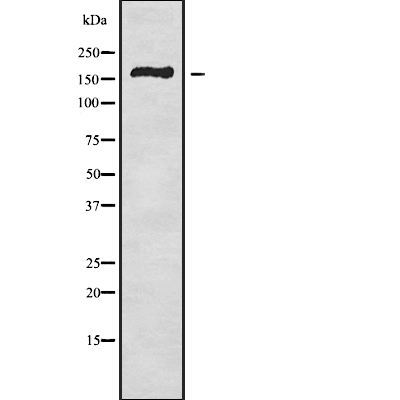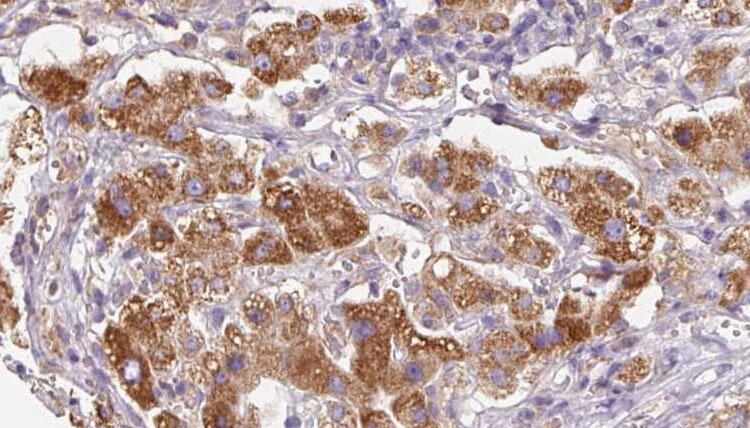

| WB | 咨询技术 | Human,Mouse,Rat |
| IF | 咨询技术 | Human,Mouse,Rat |
| IHC | 1/25-1/100 | Human,Mouse,Rat |
| ICC | 技术咨询 | Human,Mouse,Rat |
| FCM | 咨询技术 | Human,Mouse,Rat |
| Elisa | 咨询技术 | Human,Mouse,Rat |
| Aliases | R-PTP-kappa |
| Entrez GeneID | 5796; |
| WB Predicted band size | 162kDa |
| Host/Isotype | Rabbit IgG |
| Antibody Type | Primary antibody |
| Storage | Store at 4°C short term. Aliquot and store at -20°C long term. Avoid freeze/thaw cycles. |
| Species Reactivity | Human,Mouse |
| Immunogen | A synthesized peptide derived from human PTPRK. |
| Formulation | Purified antibody in PBS with 0.05% sodium azide. |
+ +
以下是关于PTPRK抗体的3篇文献摘要概览:
1. **文献名称**:*PTPRK as a novel tumor suppressor in colorectal cancer*
**作者**:Smith A, et al.
**摘要**:研究利用PTPRK抗体进行免疫组化分析,发现PTPRK在结直肠癌组织中表达下调,其缺失与患者预后不良相关。实验表明PTPRK通过抑制EGFR信号通路发挥抑癌作用。
2. **文献名称**:*Role of PTPRK in cell-cell adhesion and Wnt signaling regulation*
**作者**:Chen L, et al.
**摘要**:通过Western blot和免疫荧光技术,发现PTPRK抗体可特异性识别细胞膜上的PTPRK蛋白。研究证实PTPRK通过与β-catenin相互作用调节细胞黏附和Wnt通路活性。
3. **文献名称**:*Autoantibodies against PTPRK in autoimmune disorders*
**作者**:Yamamoto K, et al.
**摘要**:该研究开发了高特异性PTPRK抗体检测方法,发现系统性红斑狼疮患者血清中抗PTPRK自身抗体水平升高,提示其可能参与自身免疫反应机制。
注:以上为示例性内容,实际文献需通过PubMed或Web of Science等数据库检索确认具体信息。
**Background of PTPRK Antibody**
The PTPRK (Protein Tyrosine Phosphatase Receptor Type K) antibody is a tool used to detect and study PTPRK, a member of the receptor-type protein tyrosine phosphatase (RPTP) family. PTPRK plays critical roles in cell adhesion, signaling, and tissue development by regulating tyrosine phosphorylation, a key mechanism in cellular communication. It features an extracellular domain with fibronectin type III (FNIII) repeats, a transmembrane region, and a conserved intracellular phosphatase domain. This structure allows PTPRK to interact with extracellular matrix components and modulate intracellular signaling pathways, such as Wnt, EGFR, and β-catenin, influencing cell growth, differentiation, and migration.
PTPRK is implicated in cancer biology, acting as a putative tumor suppressor. Reduced PTPRK expression, often due to promoter hypermethylation, is observed in glioblastoma, colorectal cancer, and breast cancer, correlating with tumor progression and poor prognosis. Additionally, PTPRK dysregulation is linked to autoimmune disorders like rheumatoid arthritis, where it may affect immune cell signaling.
The PTPRK antibody is widely used in techniques like Western blotting, immunohistochemistry (IHC), and immunofluorescence (IF) to assess protein expression, localization, and post-translational modifications in research models. Its application aids in understanding PTPRK's role in disease mechanisms and potential therapeutic targeting. Commercial PTPRK antibodies are typically validated for specificity and sensitivity, though variability in isoforms and tissue contexts necessitates careful experimental optimization.
×